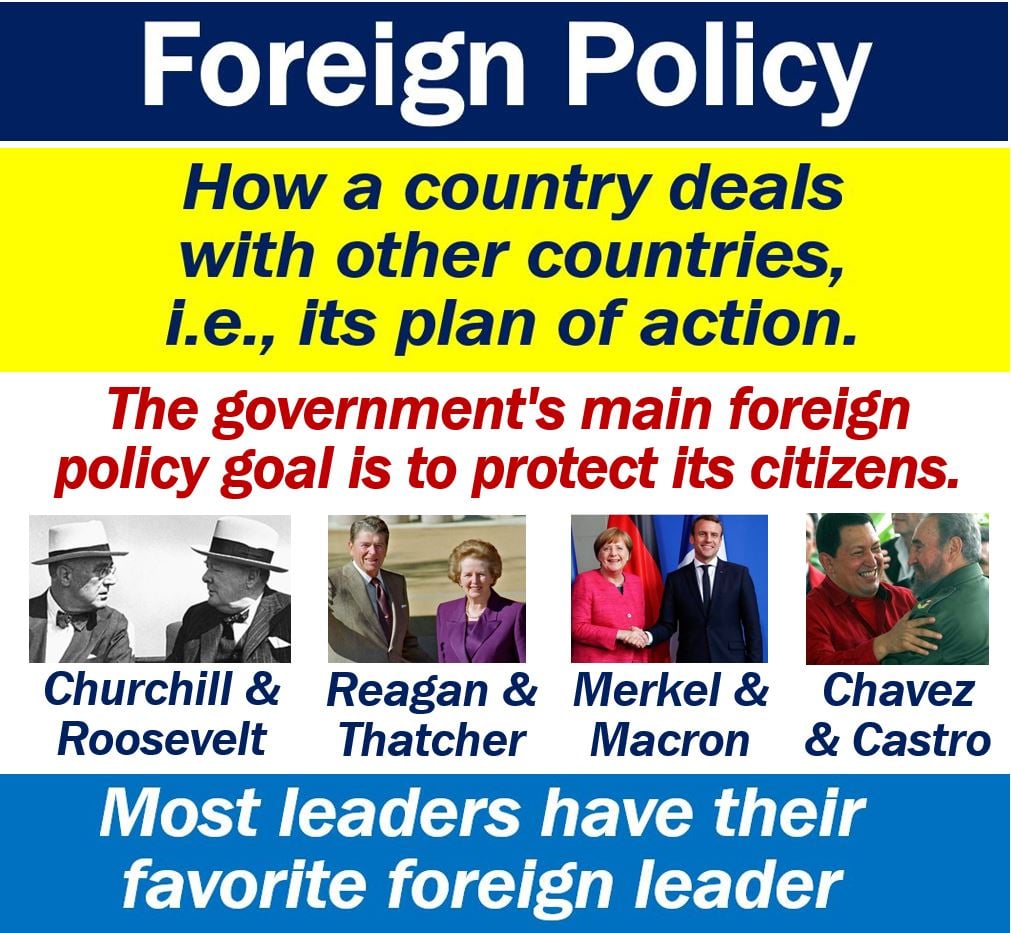Foreign Policy or Foreign Relations refers to how a government deals with other countries. We also call it Foreign Affairs Policy. Foreign policy includes such matters as trade and defense. The government chooses its foreign affairs policy to safeguard the interests of the nation and its citizens.
‘Trade,’ in this context, means ‘international trade,’ i.e., imports, exports, tariffs, exemptions, etc.
Put simply; it is the strategy that the government adopts in dealing with other countries.
Typically, the foreign minister, head of government, and cabinet create the government’s foreign policy. In the US and UK, the foreign minister equivalents are the Secretary of State and Foreign Secretary respectively.
Britannica.com says the following regarding foreign policy:
“General objectives that guide the activities and relationships of one state in its interactions with other states.”
“The development of foreign policy is influenced by domestic considerations, the policies or behavior of other states, or plans to advance specific geopolitical designs.”

Foreign policy – main goals
-
Citizens
Foreign policy’s main goal is the protection of its citizens. This applies to the country’s citizens while they are at home and abroad.
-
Allies
Another goal is to contribute to the protection of the country’s allies. In other words, nations to which the country is mutually supportive and friendly.
-
Threats and dangers
Foreign policy also focuses on protecting the country and its people from international threats and dangers.
Regarding these dangers, LumenLearning.com writes:
“In the international sphere, threats and dangers can take several forms, including military threats from other nations or terrorist groups and economic threats from boycotts and high tariffs on trade.”
Tariffs are taxes and duties. A tariff on trade is an import tax.
Foreign policy – wars
After two World Wars in the twentieth century, foreign relations became a growing public concern. It also became a major field of study and research. This was not the case in many countries, such as the US, earlier.
From 1945, i.e., the end of WWII, until the 1960s, many theories emerged as a result of considerable research.
Several theories gradually grew around international politics, international systems, and international relations. However, most of the focus was on international relations rather than foreign policy.
At the time, governments, unlike today, were very secretive about their foreign policies. Politicians at the time did not think it was appropriate for the public to know about such policies.
Regarding this secrecy, Wikipedia writes:
“This iron-bound secrecy is an essential part for the framework of foreign policy formulation.”
During this century and the end of the last century, access to government records became easier. Subsequently, research into foreign policy grew rapidly.
Universities and colleges across the world started offering graduate and post-graduate courses.
Today, international relations is a major academic discipline in many universities.
Diplomacy, economic aid, and military force are some of the key instruments that states employ to execute their foreign policy objectives.
In the digital age, information technology and cybersecurity have become integral aspects of a nation’s foreign policy to protect its interests in cyberspace.
Foreign policy – United States
George Washington (1732 – 1799), the first President of the United States, was not keen on joining alliances with other countries.
During his Farewell Address in 1789, Washington said:
“It is our true policy to steer clear of permanent alliance with any portion of the foreign world. Peace, commerce, and honest friendship with all nations-entangling alliances with none.”
From 1789 until the end of the Second World War, the United States only entered one major treaty. That treaty was with Panama.
Since 1945, however, in a dramatic foreign policy U-turn, the US has allied itself with half the globe.
However, a sizable portion of the American electorate today agrees with Washington’s opinion.
According to USHistory.com:
“Today some Americans think that Washington’s words are still wise ones, and that the United States should withdraw from world affairs whenever possible.”
Video – What is Foreign Policy?
This video, from our YouTube partner channel – Marketing Business Network – explains what ‘Foreign Policy’ is using simple and easy-to-understand language and examples.
